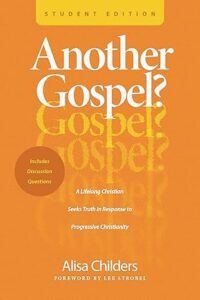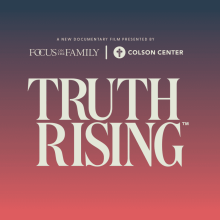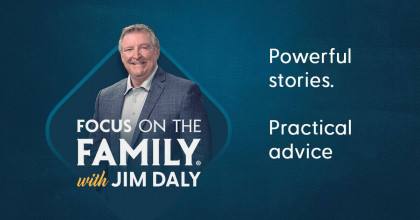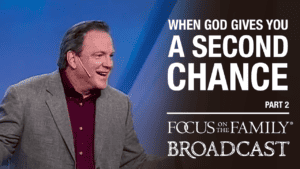Preview:
Alisa Childers: Christianity is true whether you feel it or not, and that gives me peace. When you don’t have the experience or you feel like you can’t hear God’s voice or feel His presence, He is who he said He is, and it is true objectively in reality whether your feelings line up with that or not.
End of Preview
John Fuller: Hmm. Well, if you know anyone who is struggling with their faith right now, stay tuned, we have a message of hope for you today. This is Focus on the Family with Jim Daly, and I’m John Fuller.
Jim Daly: Alisa Childers is our guest today, and she’s going to share a fascinating look at how she almost lost her faith while being mentored by a pastor who was secretly an agnostic. And the best part is Alisa was motivated to do intense research into the pillars of our faith and found them to be true, praise God for that. So she proved it for herself. Now, let me set up Alisa’s background. Uh, she grew up with parents who were a big part of the Jesus movement in the early-1970s. Her dad, Chuck Girard, founded one of the very first Christian bands called Love Song at Calvary Chapel in Southern California. And you’ll hear more about Alisa’s childhood and how it formed her faith in just a moment.
John: Yeah, and if you saw the movie Jesus Revolution, you can see the atmosphere there that, uh, Alisa was raised in, uh, those were some pretty ardent believers who felt compelled to share the gospel. Here, now, Alisa Childers, uh, speaking to a huge group of college students at Liberty University on today’s episode of Focus on the Family with Jim Daly.
Alisa: Well, I was raised obviously in a Christian home. My mom and dad both gave me the real gospel, and I loved Jesus as far back as I can remember. In fact, I don’t even remember a time in my life when I wasn’t aware of the presence of God, when I wasn’t deeply convinced in my bones that Jesus is exactly who he said he is, and that the Bible is his word. I lived my life by that, not perfectly, I had my moments, but I always knew that it was true. One of the things I got to do as a very young child was be involved in what my dad called street ministry. And what that meant was we would go out on the streets of Hollywood and in other places in Los Angeles, and sometimes, even New York City, and we would set up a stage and my dad and his friends would sing, and those of us who weren’t singing would go out into the crowd and share the gospel. We would pass out gospel tracts and try to win people to Christ.
So I didn’t grow up in a Christian bubble in that I wasn’t ever exposed to other worldviews. You don’t do street ministry on Hollywood Boulevard on Halloween and not meet some interesting folks. (Laughs) So my faith wasn’t blind, I saw the power of the gospel. But there was something about my faith that I didn’t realize back in those times was weak and untested, and that was the intellectual side of my faith. I was never rattled by the Discovery Channel or any of those other outlets that would bring on skeptics and scholars to debunk the resurrection or to prove the Bible to be untrue, none of that ever rattled me. So I followed in my dad’s footsteps and was a part of the contemporary Christian group, ZOEgirl. And we got to travel all around the country in all over different parts of the world sharing Jesus with young girls.
That was our audience. We wanted to encourage young girls to stand strong for Jesus on their public school campuses, and it was such a joy to get to do that. About – around the time that ZOEgirl was coming to a close, we were all married by now and starting to have kids. So we came off the road. Now, I’ll be honest with you, there were some things about my time touring in Christian music that made me vulnerable to what would happen next. I wasn’t even really praying that much by the time of the end of my seven or so years of touring. And it’s not because I didn’t love Jesus, I had just become tired and a bit depressed. So when we came off the road, I wanted to go get my kids in church, I wanted to get our family in church. So my husband and I settled in a non-denominational evangelical church right in the heart of the Bible Belt in Middle Tennessee.
And we loved this church, we loved the pastor’s intellectual approach to the sermons, we loved the sense of community we found among the like-minded believers there. We were home. Well, after about eight months of attending this church, the pastor pulled me aside and he said, “You know, I’d like to invite you to take part in an inner circle type study and discussion group.” He said, “This is gonna be like going to seminary.” Now, this sounded really exciting to me because although I wasn’t really aware of how untested my faith was intellectually, I was excited to learn the why behind the what. Why do I believe the Bible is the word of God? Why do I believe that Jesus is who He said He is? And so I showed up to that first class with my Bible, my notebook, my pen, ready to dig in and learn.
And what I was totally unprepared for was that in that first class, the pastor revealed to this very small and exclusive group that he was actually an agnostic. He called himself a hopeful agnostic. Now, back then, I wasn’t totally sure what that meant. I knew agnostics were people who maybe weren’t that sure about what they believe about questions of God and the supernatural. But I suspect this pastor maybe was hoping Christianity was true, but he had become unconvinced. And throughout the course of the four months or so that I lasted in this class, every core precious belief that I had held about God, about Jesus, and about the Bible, especially the Bible, the Bible was under constant scrutiny, all of these beliefs were picked apart, they were explained away, they were deconstructed. And I would find out later that this pastor had already deconstructed his faith and had converted to something called progressive Christianity.
And his hope was to get the members of his congregation into deconstruction so that he could convert them to progressive Christianity. Now, deconstruction is a phenomenon that’s happening all over, especially in the United States. And maybe you’ve seen it on social media where maybe a Christian leader that you follow, a musician, an author, even sometimes seminary professors, will go on social media and say, “Hey, I had all these questions about what I believe, nobody could answer my questions, and now I’ve decided that Christianity is toxic, or at least the version that I followed is, is very toxic and harmful. So I’m no longer a Christian.” And in some cases, they might still identify themselves as a Christian, but it’s a more progressive type of Christianity, which is going to demote the Bible into the realm of just being someone’s opinion, it’s going to embrace all the cultural ethics as they would relate to sexuality, and marriage, and gender, but they’re gonna keep that title, Christian. And that’s where this pastor was at.
One by one, I watched the people in my class become more progressive types of Christians and get into this process of deconstruction. Now, while I was in the class, I would try to debate the pastor. I didn’t do a very good job of it, I, (laughs) I didn’t know much. So I’d go home and I would Google stuff, and I would come back and try to refute what he was saying. But it wasn’t until we left the church, and I left that class that I didn’t have anyone to debate with anymore. It was just me, alone, with all of the seeds of doubt that had been planted in my heart. And those seeds grew, and they propelled me into a faith crisis that I can only describe as being plunged into a stormy ocean, with waves of doubt just crashing over my head, and crashing over my head.
And I was dog paddling, trying to keep my head above water, but I came to the point of not even knowing if God exists at all. Because you see, this pastor was able to knock out two pillars from my worldview. I didn’t know this then, I look back and I see this now, my worldview was built upon my experiences and upon my presupposition that the Bible was God’s word. Now, he knocked out the pillar of my experience by convincing me that every time I was in a great worship service, every time I was at summer camp and I could really feel the spirit, those were all just synapses in my brain firing in response to sociological stimuli that I wanted to be true, that I felt warmed by, that I felt a connection with. And he pointed out, “You know, you can have that experience at a rock concert, or looking at a great work of art, or hearing a great song, or reading a great poem.” I couldn’t argue with that.
The second pillar was my presupposition that the Bible was God’s word. This pastor was able to intellectually convince me that we didn’t even have an accurate copy of what they originally wrote, and that the people we think existed as historical figures probably didn’t really exist, and the people we think wrote the books probably didn’t really write them, and they were probably legendary developments that happened many decades later. I didn’t know what to do with that. Both of those legs were knocked out from under me. And I just remember crying out to God one night. I said, “God, if you’re real, if everything I’ve believed about you, my whole life, is true, I need You to show up.” And it felt like that prayer was being spoken into a vacuum, an utter void of spiritual darkness. But over the course of a few months, God allowed me to wrestle in that darkness. I believe, so that I could be here today to tell you, that Christianity is true, whether you feel it or not. And that gives me peace. (Applause)
When you don’t have the experience or you feel like you can’t hear God’s voice or feel his presence, He is who He said he is, and it is true objectively in reality whether your feelings line up with that or not. And that has given me so much freedom as I’ve matured in my faith. Well, He did answer that prayer, and I began to study. I began to read everything I could get my hands on, the arguments for the reliability of the Bible, the arguments for the existence of God, the truthfulness of Christianity, and the claims of Jesus Christ. And I came on the other side of that five-year process, persuaded now, not just emotionally but intellectually, that the Christian worldview is true, and that the Bible stands tall atop the rubble of accusations that are launched against it. It is reliable, it was written by who we think wrote it, they did really exist, and we do have an accurate copy.
So as I was thinking about how God rebuilt my faith and what I went through in those moments, and how faithful He was to shepherd me through those moments and not let me feel the feels, because I had to engage my brain in those moments, I thought, what would I tell my younger self? I’m coming to speak to young people, what if I would’ve been in the audience? What would I have told my younger self? So I wanna leave you with four nuggets of wisdom that I hope you will take with you for your whole life. Number one, don’t let anyone talk you out of truth. Number two, don’t let anyone talk you out of the Bible. Number three, don’t let anyone talk you out of the cross. Number four, don’t let anyone talk you out of the nature and character of God as revealed in both Old and New Testaments and demonstrated on the cross.
Now, I wanna unpack those for you, because years later, when my faith was becoming re-stabilized, the church where that class took place, one Sunday morning, re-branded itself. They took down the Nicene Creed from their website, they wrote their own creed that emphasized the power of personal conscience, they became LGBTQ+ affirming, and they said, “We are now a progressive Christian community.” Now, that was the first time I heard the phrase progressive Christianity. But having been discipled by a progressive Christian pastor, I sort of understood what it was all about. And I began to study the movement of progressive Christianity to figure out what do progressive Christians believe? And you know what I learned? It’s not so much about what they believe, it’s about what they have been talked out of, not talked into.
John: You’re listening to Alisa Childers on Focus on the Family with Jim Daly, and we highly recommend the student edition of her book called Another Gospel? It’s a complete resource for anyone questioning their faith. And we’ll send that to you for a donation of any amount today. We’ll also include a free audio download of the entire presentation by Alisa. Uh, just donate and request those resources at FocusontheFamily.com/broadcast or call for details (800) 232-6459. That’s 800, the letter A, and the word FAMILY. Let’s return now to more from Alisa Childers.
Alisa: So let’s talk about this first one, don’t let anyone talk you out of truth. Along with our culture, progressive Christianity has rejected the idea that truth exists outside of ourselves. It’s as if the standard for truth has been moved from an objective standard outside you just into your own internal self. You are the truth maker now, your thoughts, feelings, preferences, these become the standard not just for what is true, but for what is good. And they actually, in this culture, want you to believe that that’s your actual identity. But friends, your feelings are gonna change on the daily. My feelings change on the daily. If I have my identity rooted in something that’s changing constantly, I will never have a firm foundation to stand on. Jesus claimed to be the truth, he said, “I am the way, the truth, and the life.” If Christianity is true in objective reality outside of our opinions and preferences, that means it’s true for everyone, which means it has eternal consequences for everyone.
The enemy of our soul has done a great job of deconstructing truth, but don’t let anyone talk you out of truth. Number two, don’t let anyone talk you out of the Bible. Don’t let anyone nuance you out of believing that the Bible is the inspired, infallible, inerrant word of God. Everything about your life will depend on what you think the Bible even is. Now, progressive Christianity will offer you a religion apart from the authoritative standard of scripture, you get to be the authoritative standard. I can see why that’s appealing, but I would ask my young self, “What is the Bible?” Is it primarily a human book about God, or is it God’s self-revelation for us to get to know who He is? This is what Jesus taught over, and over, and over again.
When Jesus would quote from or cite the Old Testament scriptures, He would say, “This is the Word of God.” Word of God. The enemy of our souls has not just done a good job of deconstructing truth, but also deconstructing words or language. Ever since the rise of postmodernism in the late ’60s with philosophers like Jacques Derrida who didn’t believe that words could be pinned down to objective meaning, or that there could be some grand metanarrative of reality that could be known or claimed to be known. Ever since then, we have been swimming in a soup of a rejection of objective truth, not just when it comes to reality, but specifically words. Now, what a brilliant plan. If you’re the enemy of human beings, and if you can deconstruct the idea that words have objective meaning, or that the word of God has objective meaning, well, then people are free to create their own meaning. Don’t let anyone talk you out of the Bible.
Number three, don’t let anyone talk you out of the cross. Progressive Christianity will offer you religion without the substitutionary, sacrificial death of Jesus Christ on the cross, bearing our sin upon himself in satisfying the wrath of God. In fact, in the mind of the progressive Christian, the idea that God, the Father, would require the blood sacrifice of his only son turns God into a cosmic child abuser. And that is rejected, they are talked out of that. About 700 years before Jesus walked the earth, Isaiah prophesied about what theologians call the suffering servant. I’m just gonna read you a few little pa- bits and pieces from that prophecy. “He was pierced for our transgressions, he was crushed for our iniquities; the punishment that brought us peace was upon him, the Lord has laid on him the iniquity of us all.”
Million-dollar question is, what did Jesus teach about the cross? Well, the night before he was betrayed, in Luke 22, Jesus quotes from Isaiah 53, and He said, “I tell you that this must be fulfilled in Me. Yes, what is written about Me is reaching its fulfillment.” Friends, these are not just little tropes we sing, these words are life and death, “Behold the Man upon the cross, His dying breath has brought me life, I know that it is finished.” There are people who will offer you a, quote, unquote, “Christianity” without this reality. But you know what, friends? And this is what I would say to my younger self, don’t budge on that. Don’t get talked out of substitutionary atonement. It’s a good opportunity to do a heart check, because you will not find the substitutionary sacrifice of Jesus beautiful unless you know that you’re a sinner.
And every media platform, all of the secular messages in our culture aimed specifically at you and your generation are telling you, you are perfect just as you are. You should trust your good heart, follow your heart, trust your instincts. But friends, the Bible tells us that the heart is deceitful and wicked. Jesus said that out of the heart flow all manner of immorality. We know that from Ephesians, we are children of wrath before we become children of God, which, by the way, is a right we will receive when we believe and trust in Jesus. That is a more stable foundation to stand on than making your feelings, your identity. Because you know what? If you’re in Christ, you’re not just saved, you’re not just a member of the church, you are adopted into a family, and you are no longer under God’s wrath, you are under His mercy. (Applause) So don’t let anyone talk you out of the cross.
And finally, don’t let anyone talk you out of the nature of God as revealed in the Bible and demonstrated on the cross. This is the gospel. Progressive Christianity will offer you an all-inclusive God who is only love redefined, but would never be wrathful, a God who would never send people to a place of punishment called Hell. But what did Jesus teach? Jesus said in John 3:17, we all love John 3:16, but in 17, he says, “For God did not send His Son into the world to condemn the world,” praise God, “but in order that the world might be saved through Him. Whoever believes in Him is not condemned, but whoever does not believe is condemned already.” So Jesus is all-inclusive in his invitation, but He is exclusive when it comes to who has the right to be called a child of God, and it’s only those who turn from their sin and from themselves and trust in Him.
Jesus said in Luke 9:23, “If anyone would come after Me, let him deny himself, take up his cross daily and follow Me.” Jesus easily could have said, “If anyone would come after Me, let him find his true, authentic self. Let him live his truth.” But he said, “Let him deny himself, pick up his cross,” which we look at as a symbol of victory, rightly, but remember He said this before He was crucified. What was the cross? It was an instrument of death, and humiliation, and excruciating torment. “If anyone would come after Me, let him deny himself, pick up his cross and follow Me.” The enemy of our souls has done a good job of deconstructing truth, language, theology, and the very nature and character of God. He would have you believe that you can have God without wrath, Jesus without the Bible, and religion without cost.
What I would tell my younger self is, “Young Alisa,” (laughs) “Jesus is more good, more loving, more kind, and more merciful than you know, and Jesus is more severe and wrathful than you think.” He came the first time to offer salvation to sinners. He didn’t come into the world to condemn the world, but He’s coming the second time to make war with His enemies. We have a choice; you all have a choice. I would tell my younger self, “You have a choice. You can be at war with Him when He comes, or you can be at peace with Him under his mercy.” Jesus is who He said He is, Christianity is true. And you can call on the name of the Lord and be saved.
John: Hmm, what a passionate message from Alisa Childers today on Focus on the Family with Jim Daly. And thanks by the way to our friends at Liberty University for allowing us to share this message with you.
Jim: Yeah, thank you Liberty. And uh, this is an outstanding message. My heart goes out to those of you listening who are already dealing with a loved one who is deconstructing their faith, it’s such an enormous trend these days. So please, if you need to talk to someone, give us a call. Our friendly staff would count it a privilege to hear your story and pray with you. And if needed, you can request a call back from one of our caring Christian counselors. This is a free service that we are able to provide, thanks to our wonderful donors. And for the rest of you, please consider donating to Focus on the Family to help us make these counseling services available to everyone who needs them. Every month, over 2,000 people request a call back from our counseling team, that’s a lot of hurting people that we can help together.
The best way to help is by making a monthly pledge. Jean and I support focus that way, uh, John, you and Dena do the same.
John: Mm-hmm.
Jim: It doesn’t have to be a large amount; it’s the consistency that helps us even out the annual budget and plan for future projects. And when you make a monthly pledge of any amount, I’d like to send you the student edition of Alisa’s book, Another Gospel? A Lifelong Christian Seeks Truth in Response to Progressive Christianity, and that will be the perfect resource to pass along to someone who is doubting their faith. And if you can’t make a monthly pledge, we get that, that’s okay, we can send you Alisa’s book for a one-time gift of any amount, and we’ll include a free audio download of her entire message at Liberty with extra content. Finally, uh, let me share an additional follow-up resource for those of you who want to be examples of Jesus Christ’s love and truth to our confused culture. We’ve produced a new documentary in partnership with the Colson Center called Truth Rising. The film and the follow-up study will equip and challenge you to make a difference, bringing hope and renewal to a broken world. You’ll find details about Truth Rising at our website.
John: Yeah. Visit us online to see all that we have and, uh, donate generously as you can too. Uh, you’ll find us at FocusontheFamily.com/broadcast, or call (800) 232-6459. That’s 800, the letter A, and the word FAMILY. Next time, Dr. John Townsend will explain the importance of boundaries in marriage.
Dr. John Townsend: Look at Proverbs 4:23, it says, “Guard your heart, for from that flow the wellsprings of life.” Our heart is kind of all we have.
John: Mm-hmm.
Dr. John Townsend: You know, our, our values, and our passions, our emotions, our thoughts, where we’re going in life, and that’s inside our skin. That’s our ultimate boundary, is what’s inside of us.

















